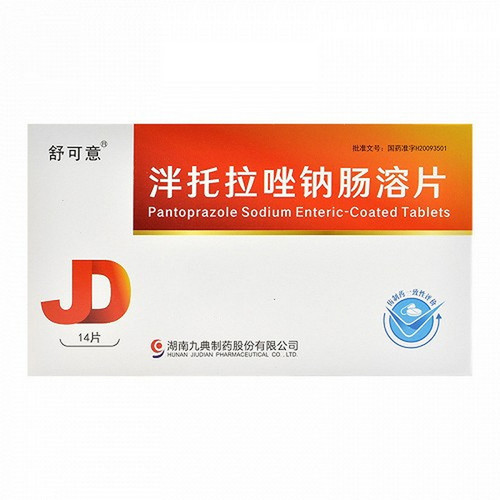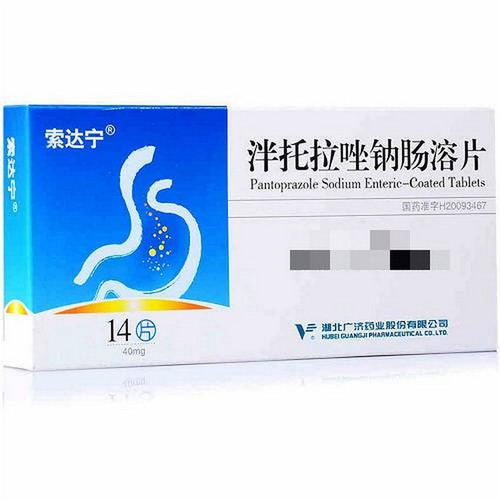Product Overview
[Drug Name]
Generic Name: Pantoprazole Sodium Enteric-Coated Tablets
Trade Name: Pantoprazole Sodium Enteric-Coated Tablets 40mg x 14 Tablets
Pinyin Full Code: PanTuoLuoKe ZuoTuoLaZuoNaChangRongPian
40mg x 14 Tablets
[Main Ingredient]
The main ingredient of this product is hemtoprazole sodium.
[Properties]
This product is enteric-coated tablets, appearing white or off-white after removal of the coating.
[Indications/Main Functions]
Indicated for active peptic ulcers (gastric and duodenal ulcers), reflux esophagitis, and Zollinger-Ellison syndrome.
[Specifications]
40mg x 14 tablets
[Dosage and Administration]
Take 40mg (1 tablet) orally daily before breakfast. The treatment course for duodenal ulcers is usually 2-4 weeks, while the treatment course for gastric ulcers and reflux esophagitis is usually 4-8 weeks.
[Adverse Reactions]
Dizziness, insomnia, drowsiness, nausea, diarrhea and constipation, rash, and muscle pain may occasionally occur during clinical use.
[Contraindications]
This product is contraindicated in patients with allergies, breastfeeding women, and women in the first trimester of pregnancy.
[Drug Interactions]
Oxytoprazole has minimal interactions with other drugs. Compared to omeprazole, it has a lesser effect on the cytochrome P450 system and does not affect the duration of diazepam action. It has no significant interactions with oral contraceptives, digoxin, warfarin, phenytoin, or theophylline.
[Precautions]
1. High doses may cause arrhythmia, elevated transaminases, changes in renal function, and decreased granulocyte counts. 2. This product is an enteric-coated formulation and should not be chewed. 3. When gastric ulcers are suspected, the possibility of cancer should be ruled out first. This is because treatment with this product may alleviate symptoms and delay diagnosis. 4. Efficacy and safety data for this product in children have not yet been established. 5. Use with caution in patients with hepatic and renal impairment. Please read the instructions carefully and use as directed by your doctor.
[Pediatric Use]
The efficacy and safety data for this product in children have not been established. It is contraindicated in infants and young children.
[Elderly Use]
No dose adjustment is required.
[Overdose]
High doses may cause arrhythmia, elevated transaminases, changes in renal function, and granulocytopenia.
[Pharmacology and Toxicology]
This product specifically acts on gastric mucosal parietal cells, reducing the activity of H+-K+-ATPase in these cells, thereby inhibiting gastric acid secretion. Compared with omeprazole, this product has a weaker inhibitory effect on cytochrome P450 enzymes.







